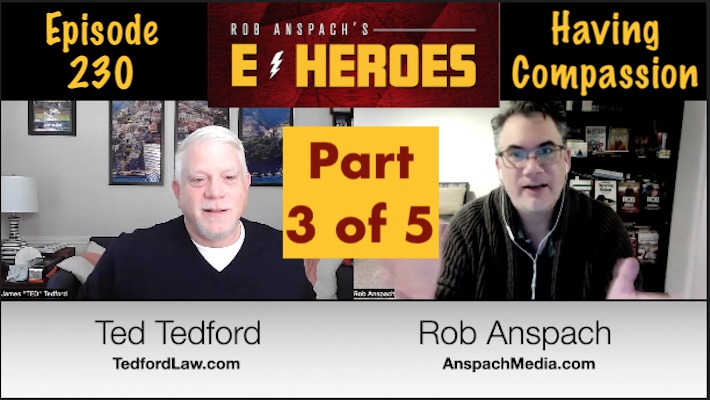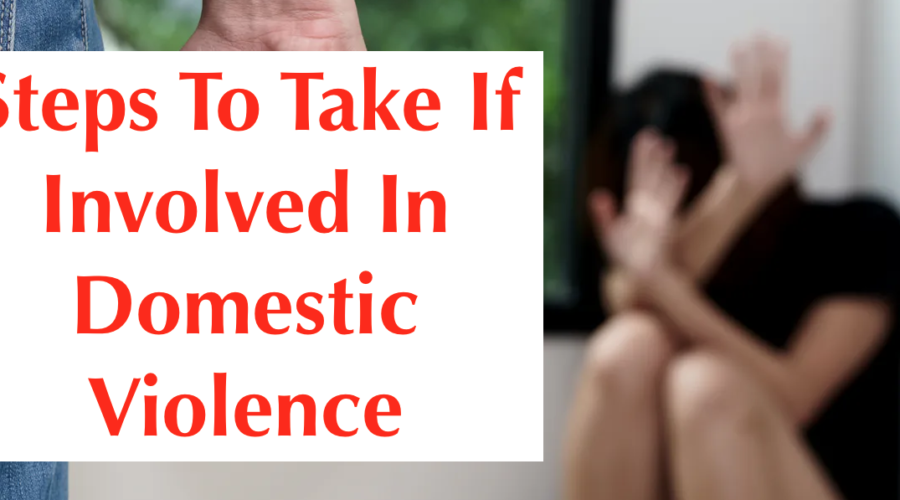Pasadena Criminal Defense and Personal Injury Attorney Ted Tedford sits down with Rob Anspach and shares his thoughts on establishing liability, negotiating the legal system, pain management, mentoring, integrity and self-care on episode 230 of the E-Heroes podcast. This is Part 3 of 5.
Rob Anspach:
Yeah. And, and it goes back to compassion, because you felt compassion, you felt empathy, you felt, , a personal responsibility to help these people. And now they’re saying, yeah, I trust him so much. I want him to represent my son, my grandson. And that speaks volumes because a lot of big attorney firms are just there to churn and burn. They just want that cycle of customers.
Ted Tedford:
I can honestly say, as you know, you’re not going to find my face on a billboard. You’re not going to see me on the two o’clock in the morning commercials that run all night, <laugh>. We have a fairly medium sized office, and we pay close attention to our clients. We get to know them. And as a result, most of my clients come from referral.
Rob Anspach:
Yeah. That’s the best way to do it. And, granted, I’m in the marketing business, and one of the things I strongly encourage everybody to do is have some type of referral program, whether you’re just asking or whether you actually encourage. The more you can get in referral, the better.
Ted Tedford:
Yeah. And I guess that’s probably the part that I’m learning more now than I used to, is it’s important to ask mm-hmm. <affirmative> I’ve built those relationships, I get those referrals. But over time, in the past, I didn’t ask for referrals very much. I felt that maybe that was overstepping my place, and maybe that’s an old fashioned sort of point of view, but nowadays it seems that everybody’s asking somebody for something. So, I have built referral networks that I work with and I’m not afraid to ask.
Rob Anspach:
Well, you’re probably not also afraid to say no. So a lot of people contact you. A lot of people say, I want your help, but maybe the case just isn’t worth it. Maybe the person just is guilty as sin. Maybe whatever the reason you got to say no.
Ted Tedford:
It’s hard. I mean that’s a lesson that has taken me 30 years to develop the skills to know when to say no. Right. And I gotta be honest, it’s still really hard to say, no. You talk to somebody and they’re in need and they may have been in an accident, but you have to sometimes say, well, we have to balance out the equities. And if you hire me, you may not get much recovery on the back end because your case value is not very high on the personal injury side. On the criminal side, I have to factor in how long is the case going to go? What’s the complexity level? Are we going to be going to trial? Are we in a situation where we’re trying to negotiate the best deal because the government has the goods on us? Or are we going for a not guilty because justice needs to be served? Mm-hmm. <affirmative>. And that takes a lot of time to develop. I think, the skills and to be able to identify early on what the case is really about and where it’s going to go.
Rob Anspach:
Yeah. Wow. Yeah.
Ted Tedford:
You know, I heard a phrase, I was at a personal injury conference and I heard some guys talking and they had a saying that was very catchy, but to some degree it kind of broke my heart. And that was, all we do, we look at the case to see if the juice is worth the squeeze, <laugh>. And I get it. I mean, I get it from a business standpoint, but at the same time, it’s hard for me to look at a case and look at a client and say, oh well, you know, if you don’t have the bucks, then I can’t help
Rob Anspach:
Yeah. And, in the flip side though, you might be able to help somebody who maybe wasn’t quite worth it, and they’re going to refer you to somebody, somebody who is. Absolutely. And, so yeah, there is a balance there. I know from being an entrepreneur that sometimes I do have to say no. I have to say, I have to look at it. Okay. Not only am I raising a family and kids and grandkids, but I got employees, I got vendors, and so if I take this…
Ted Tedford:
And you have other clients that you want to provide quality service to.
Rob Anspach:
Right. And so I want to help people too, but at what expense? And granted not every car injury, not every car accident – maybe it’s only a couple thousand bucks in damage to their car. Maybe, maybe it’s just a simple broken bone, you know?
Ted Tedford:
I mean if the value is questionable, one of the things that I learned a long time ago is people just need to be told the truth. You need to be honest with them and explain that what goes in, factors into whether or not an attorney is necessary for a case. And we’ve developed a program where we can help clients through the small claims process. You know, in California you can get up to $10,000 for a claim. So if we provide them with the tools to be able to pursue their own case. I’ve had clients who I’ve rejected their cases, and then two or three years later, either themselves or family members have been referred to me by them because they were so pleased that I was actually able to guide them through that process.
Rob Anspach:
Yeah. I mean, I don’t know of many lawyers who would refer somebody to a small claims case and show them how to do it without getting any money at all. That to me, that’s unheard of. But that just goes back to your understanding of compassion and helping people. And maybe you’re not going to make any money, but you know, you’re going to help them do it themselves.
Ted Tedford:
Yeah. Like I say, I mean, sometimes you just have to, you have to get to know the person. And I had a consultation last night with a lady who was on somebody else’s property. It was a business, and she was at a recycling center. She got out of her car and she doesn’t know how she fell. She doesn’t know what she tripped on. And she was embarrassed and she went to the bathroom, cleaned herself up the best she could, told the people at the front that she had fallen. And then she thought, well, maybe I should pursue this as a legal claim. Well, I had to explain to her that just because you get injured on somebody else’s property doesn’t mean they’re liable for your injuries. Right. But through talking to her, what I did learn was that the company had an insurance policy and they had what’s called a Med Pay portion of their policy, which is a no fault portion of an insurance policy that is designed to pay for those types of incidents. So all of her medical bills out of pocket expenses, everything’s going to be paid for by that Med Pay policy, because it turned out to be a pretty big one $25,000 Med Pay policy. And she ended up having a broken leg. She didn’t realize it at the time, but when she went to the doctor later that night she had fractured her fibula.
Rob Anspach:
Wow. Yeah.
Ted Tedford:
But, you know, on the same token, I had to be honest with her and explain to her, just because you fall down and you’re on somebody else’s property doesn’t mean you, you go after him and you sue.
Rob Anspach:
Right. Yeah. Although California has been one of those states that’s been labeled so crazy, how do you deal with that?
Ted Tedford:
I mean, again, I think it just goes back to integrity and honesty and being able to explain to a client sometimes. And, and maybe it’s just that there are so many attorneys in California competing and they think, well, if I just file anything, something will stick. Right. I don’t, I don’t subscribe to that. I don’t think it’s ethical and I don’t think it does a service because at the end of the day, if you’re not, if you don’t have a good case, they’re going to be disappointed at the end.




